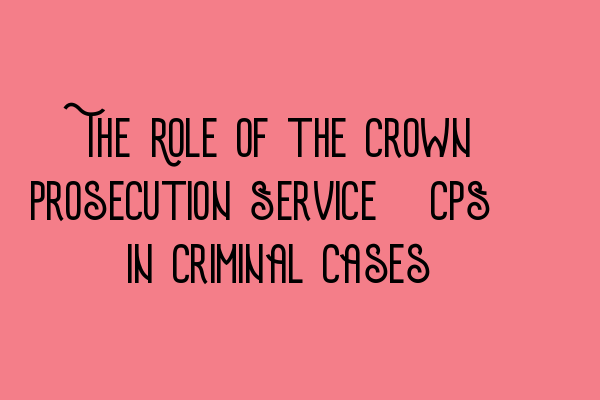The Role of the Crown Prosecution Service (CPS) in Criminal Cases
Welcome to SQE Criminal Law & Practice Law UK. In this blog post, we will delve into the important role that the Crown Prosecution Service (CPS) plays in criminal cases in the UK. The CPS is an integral part of the criminal justice system and plays a crucial role in ensuring fair and effective prosecution of criminal offenses.
1. What is the Crown Prosecution Service?
The Crown Prosecution Service (CPS) is an independent public prosecution service in England and Wales. It is responsible for prosecuting criminal cases that have been referred to them by the police or other investigative authorities. The CPS operates under the guidance of the Director of Public Prosecutions (DPP) and has the power to make charging decisions, prepare cases for court, and present them in court on behalf of the prosecution.
The CPS is committed to ensuring that criminal cases are prosecuted fairly, efficiently, and effectively, and that the principles of justice are upheld throughout the legal process. They work closely with the police and other key partners in the criminal justice system to build strong cases and secure convictions where appropriate.
2. Role of the Crown Prosecution Service in Criminal Cases
The Crown Prosecution Service has several important responsibilities in criminal cases:
- 1. Charging Decision: The CPS assesses the evidence provided by the police and other investigative authorities to determine whether there is sufficient evidence to charge a suspect with a criminal offense. This decision is made in accordance with the Code for Crown Prosecutors, which sets out the criteria for bringing a prosecution.
- 2. Case Preparation: The CPS works closely with the police and other agencies to gather and review evidence, interview witnesses, and prepare the case for trial. They ensure that all relevant evidence is disclosed to the defense in accordance with the principles of fairness and the requirements of the Criminal Procedure and Investigations Act 1996.
- 3. Court Presentation: The CPS presents the prosecution case in court, calling witnesses and introducing evidence to prove the guilt of the accused beyond a reasonable doubt. They work closely with barristers, solicitors, and other legal professionals to ensure that the case is presented effectively and in accordance with the rules of evidence and procedure.
- 4. Plea Discussions and Negotiations: In some cases, the CPS may engage in plea discussions and negotiations with the defense, with a view to securing an early guilty plea or agreeing to a lesser charge. This can help to expedite the legal process and reduce the burden on the court system.
- 5. Victim Support: The CPS is responsible for providing support to victims and witnesses throughout the criminal justice process. They ensure that victims are kept informed of the progress of their case, provide them with information about available support services, and take measures to protect their welfare and safety.
3. Importance of the Crown Prosecution Service
The Crown Prosecution Service plays a vital role in the criminal justice system for several reasons:
- 1. Upholding the Rule of Law: The CPS ensures that those who commit criminal offenses are held accountable for their actions and face appropriate consequences. By prosecuting offenders, they help to maintain public confidence in the legal system.
- 2. Protecting the Public: The CPS works to protect the public by prosecuting individuals who pose a risk to society. They prioritize cases involving serious crimes, such as murder, sexual offenses, and terrorism, to ensure public safety.
- 3. Ensuring Fairness: The CPS is committed to ensuring fairness in the criminal justice system. They carefully review evidence and consider the public interest before making charging decisions. They also play a crucial role in disclosing evidence to the defense to ensure a fair trial.
- 4. Supporting Victims and Witnesses: The CPS recognizes the importance of supporting victims and witnesses throughout the legal process. They provide information, assistance, and protection to ensure that victims and witnesses feel safe and supported.
In conclusion, the Crown Prosecution Service (CPS) plays a vital role in criminal cases in the UK. They are responsible for making charging decisions, preparing cases for trial, and presenting them in court. The CPS works tirelessly to ensure that criminal cases are prosecuted fairly, efficiently, and effectively, and that the principles of justice are upheld. Their role in upholding the rule of law, protecting the public, and supporting victims and witnesses cannot be understated.
If you are interested in further exploring the field of criminal law, we offer a range of SQE 1 Preparation Courses and SQE 2 Preparation Courses to help you in your legal studies. Additionally, if you are preparing for the SQE exams, check out our SQE 1 Practice Exam Questions and SQE 1 Practice Mocks FLK1 FLK2 to enhance your exam preparation. Stay updated with the SRA SQE Exam Dates to plan your legal education journey.
